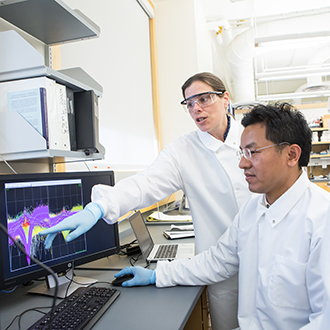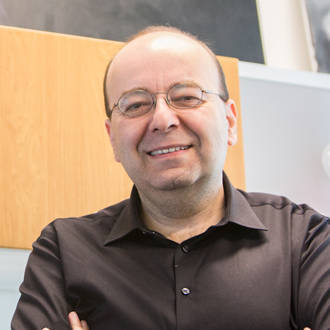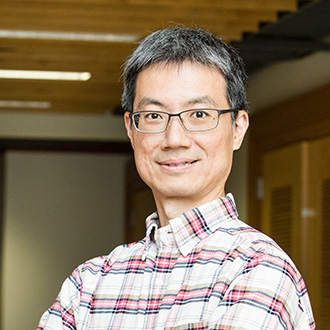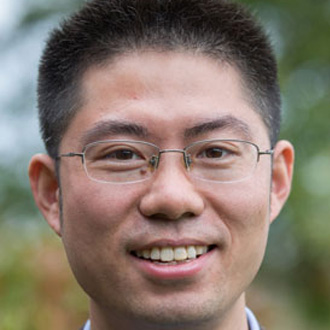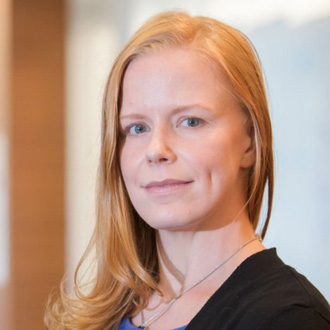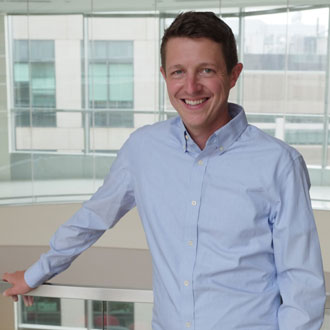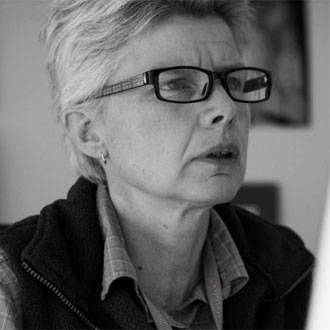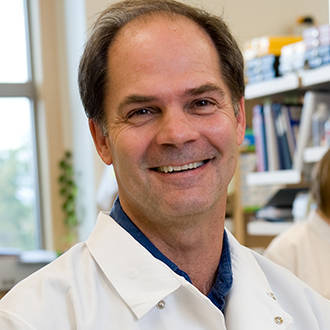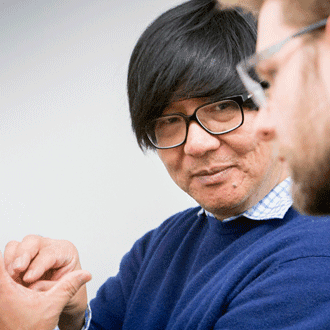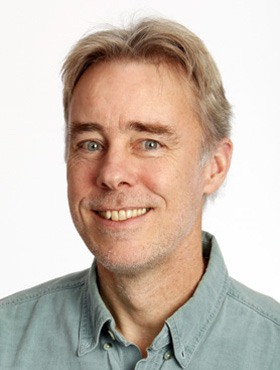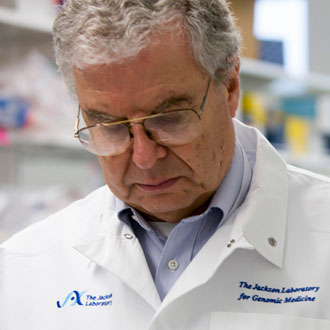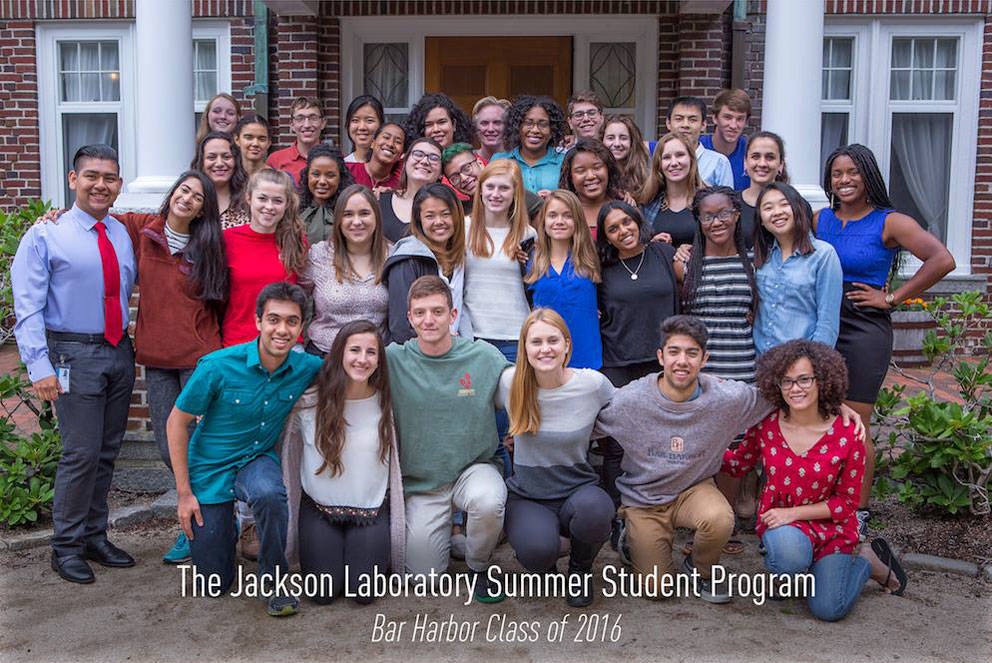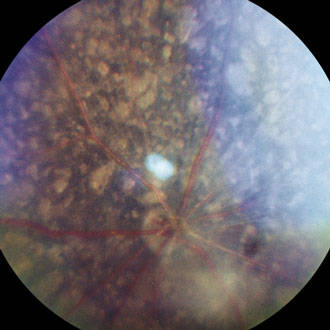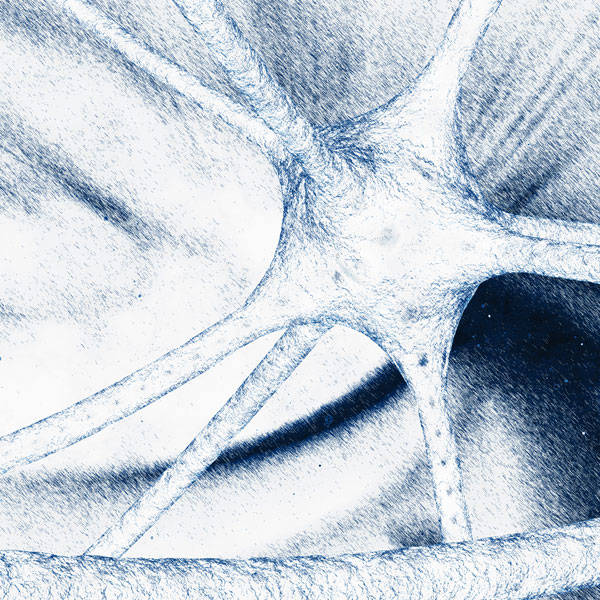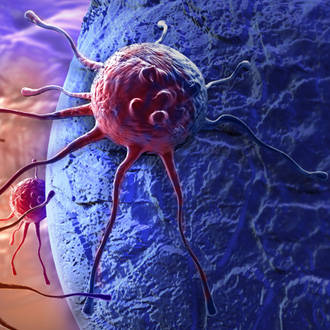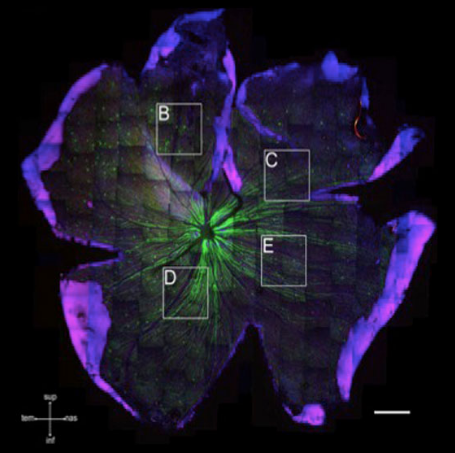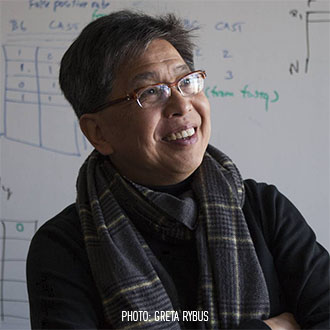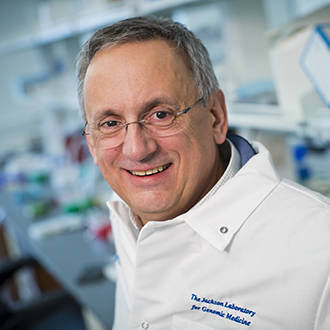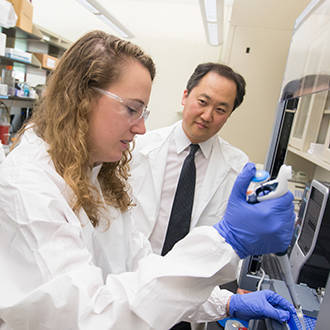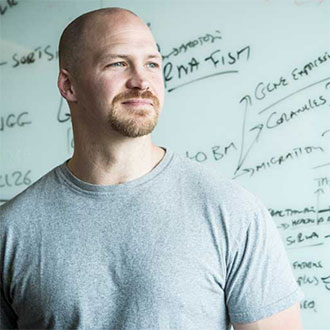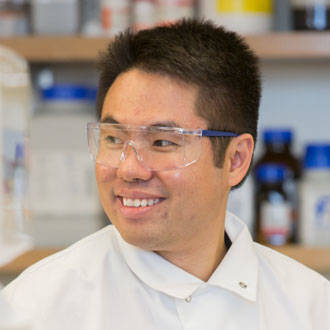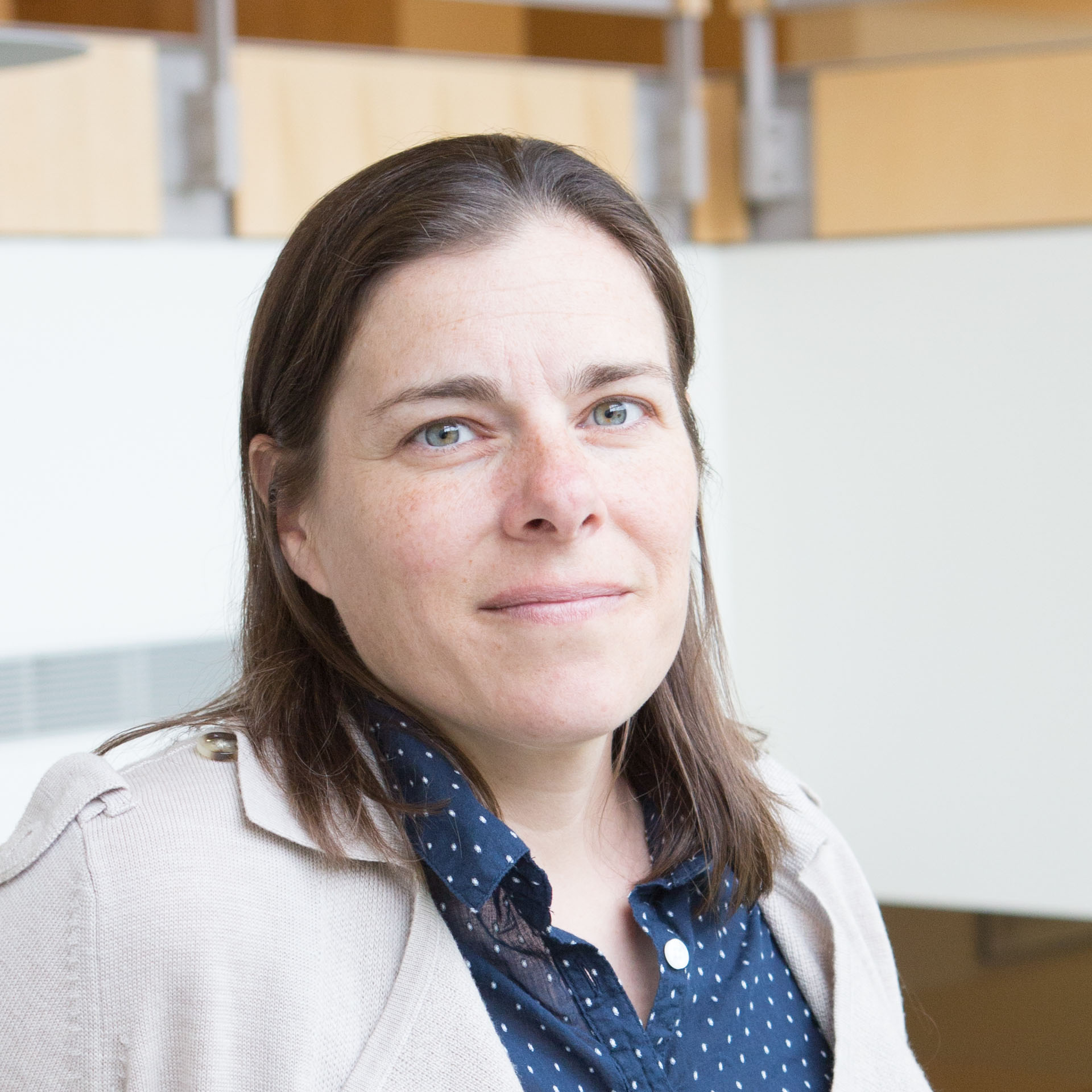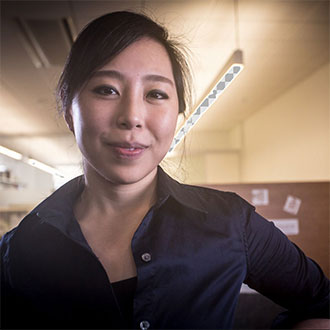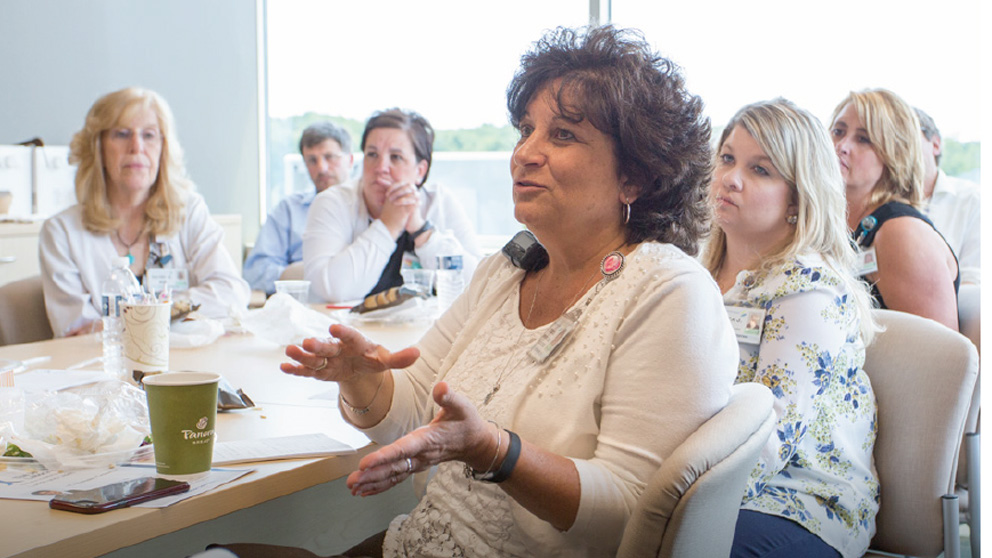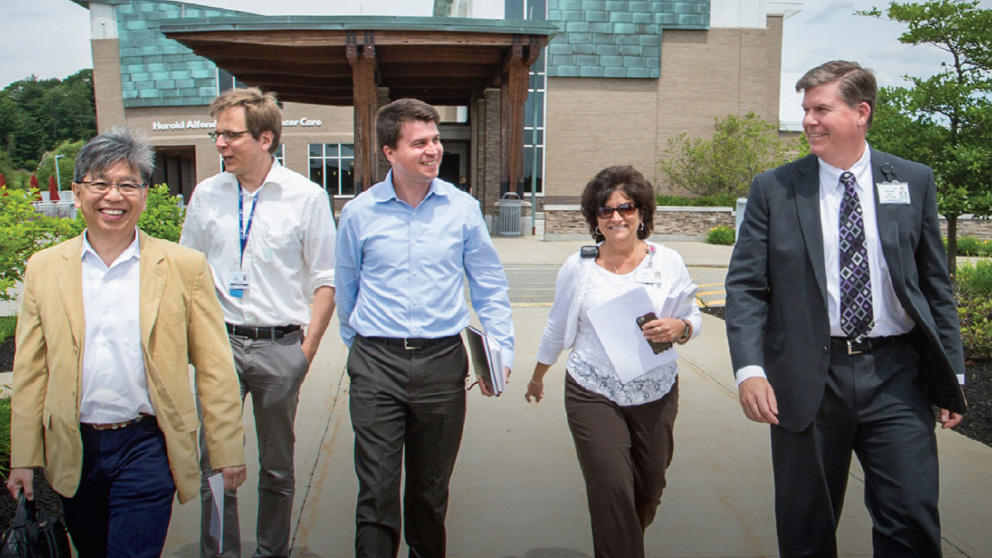Empowering Medicine2017 Annual Report
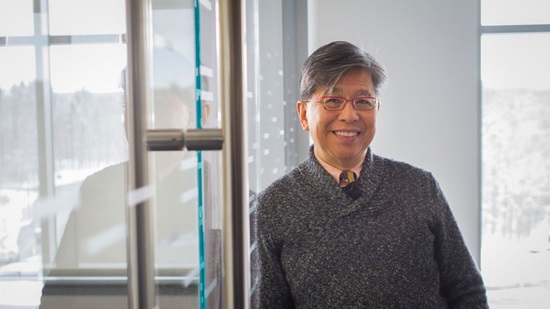
Dear Friends,
I am pleased to present the 2017 Annual Report from The Jackson Laboratory (JAX). The year was one of continued growth for the Laboratory, with exciting advances in science underpinned by a solid financial performance. Above all, JAX distinguished itself as a leader of collaborative efforts to propel scientific discovery forward and to translate research advances into improved care and better outcomes for patients.
The Maine Cancer Genomics Initiative (MCGI) offers an intriguing glimpse into how JAX is leading innovative collaborations to bring the benefits of precision genomic medicine into communities not served by academic medical centers. Through the MCGI study, JAX has brought together oncology clinicians and practices throughout Maine to expand access to genomic testing that can potentially guide more effective treatments. In addition to creating a new model for community genomic medicine, the initiative highlights the transformational potential of philanthropy, since MCGI was made possible by an extraordinary gift from the Harold Alfond® Foundation.
JAX received several large grants in 2017 to support partnership centers and projects, several of them aimed at translating research into the clinic. Among these is a multi‑institution collaborative center focused on chronic fatigue syndrome (CFS), led by Professor Derya Unutmaz, M.D., and funded by a five‑year, $10.5 million grant from the National Institutes of Health (NIH). CFS is a new area of research for JAX, but thanks to our eminent faculty and our research and computational resources, we are already emerging as a leader in the field.
Our early‑career faculty members are also hitting their stride, securing significant federal and private support for their research and garnering recognition as rising stars in the international scientific community.
As we look ahead, I am more enthusiastic than ever about JAX’s potential to transform human health through scientific discovery, and I look forward to sharing our continued progress with you.
Warm regards,
Edison Liu, M.D.
President and CEO
NewFaculty
New scientists join the quest to empower medicine
The Jackson Laboratory approaches curing disease with agile and collaborative scientific teams that bring together the unprecedented power of computational science and sequencing with an unmatched expertise in genetics.
JAX hired five new faculty members in 2017 in the following research areas:
Cancer
Chih-Hao “Lucas” Chang, Ph.D., a scientist who studies cell metabolism in tumor and immune cells, with the aim of developing new treatment approaches for cancers and immunologic diseases, has joined the JAX faculty in Bar Harbor as an assistant professor. Chang focuses on the metabolic mechanisms in controlling behavior of immune cells, such as T-cells, to conquer immunologic diseases. He came to JAX from Washington University in St. Louis.
Computational biology
A computational biologist and inventor of genomic technologies, Shengdong Ke, Ph.D., joined the JAX faculty in Bar Harbor as an assistant professor. Ke has established his first independent laboratory after completing a postdoctoral fellowship at Rockefeller University. His research focuses on RNA, a central node of genetic information flow from DNA to protein. Malfunction of RNAs leads to many human disorders.
Genetics and genomics
Christine Beck, Ph.D., a genomics expert in transposable elements and their impact on human disease, joined JAX and UConn Health as their fifth joint‑appointed faculty member. Transposable elements — which are also referred to as “jumping genes” or transposons — are DNA sequences that change location within the genome, and may make up around 40 percent of the human genome. Beck comes from Baylor College of Medicine.
Se-Jin Lee, M.D., Ph.D., an internationally renowned geneticist, is a JAX and UConn Health joint faculty appointment. He is focused on discovering causes and cures for muscle degenerative diseases like muscular dystrophy and muscle wasting conditions resulting from diseases such as cancer and sepsis. He comes to JAX from Johns Hopkins University School of Medicine.
Lee is a true pioneer in genetics. His breakthrough research includes discovering myostatin, a protein that blocks muscle growth. His work has shown that lack of myostatin leads to dramatic increases in skeletal muscle mass in the body and that problems with myostatin levels contribute to disease progression for muscle degenerative and wasting conditions such as muscular dystrophy (a genetic disease causing muscle weakening or loss), sarcopenia (muscle loss due to the aging process) and cachexia (unexplained weight loss or wasting syndrome) resulting from diseases like cancer and sepsis. Lee is focused on utilizing the properties of myostatin to develop new treatments for patients with these degenerative and debilitating diseases.
Ryan Tewhey, Ph.D., develops new molecular tools to explore the areas of the genome involved in regulation — turning genes on and off. Tewhey joined the JAX faculty in Bar Harbor as an assistant professor, where he is exploring regulatory variants and how they impact health. Tewhey completed a postdoctoral fellowship at Harvard University and the Broad Institute where he led a team that improved a technique to precisely “barcode” minute fragments of DNA in order to track their role in contributing to diseases.
PhilanthropicMilestones
Philanthropic Milestones
The Jackson Laboratory benefited from the generous support of 1,346 donors in 2017. Together, they gave $7,544,573 to support JAX scientists, research, and educational programming. The average gift size to The Helix Fund, JAX’s annual giving program, grew by 18 percent year-over-year. This increase of $300,000 is helping drive new research and initiatives across the scientific spectrum at JAX.
Endowed faculty chairs
Endowed faculty positions continue to enable JAX to recruit, retain and support the most outstanding scientists in the world. In October 2017, Judith and Anthony Evnin, Ph.D., made a gift of $1.5 million to establish the Evnin Family Endowed Chair in Alzheimer’s Research. Associate Professor Catherine Kaczorowski, Ph.D., who is taking an innovative and bold approach to combat Alzheimer’s, is the inaugural chair holder. Kaczorowski’s lab uses JAX’s unique mouse models to identify the protective factors that determine whether Alzheimer’s progresses, and how rapidly. She calls these protective factors “biomarkers of resilience,” and hopes to use that knowledge in the development of new therapies for Alzheimer’s.
Kaczorowski joins six of her fellow faculty members who currently hold endowed chairs at the Laboratory:
- Janeway Distinguished Chair — Established in 2016 by Weslie R. Janeway, vice chair emerita of the institution’s board of trustees. The chair is held by Professor Robert E. Braun, Ph.D., senior scientific advisor to the president and CEO.
- Knowlton Family Chair — Established in 2015 by Winthrop Knowlton, chairman emeritus of the Laboratory’s board of trustees. The chair is held by Professor Carol Bult, Ph.D., deputy director of the cancer center and scientific director of the Patient Derived Xenograft (PDX) and cancer avatar program.
- Karl Gunnar Johansson Chair— Established in 2014 by David J. Roux, chairman of the board of trustees, and Barbara Roux. The chair is held by Professor Yijun Ruan, Ph.D., director of genome sciences.
- Florine Deschenes Roux Chair — Established in 2014 by the Rouxs. The chair is held by Professor Gary Churchill, Ph.D.
- Donald A. Roux Chair of Genomics and Computational Biology — Established in 2014 by the Rouxs. The chair is held by Professor Peter Robinson, M.D., M.Sc.
- Evnin Family Chair — Established in 2013 by the Evnins. The chair is held by Professor George Weinstock, Ph.D., director of microbial genomics.
Planned giving
The Society for Discovery planned giving program received a total of $2,307,650 in gifts in 2017, a 942 percent increase from 2016. The Society for Discovery also welcomed 14 new members in 2017, bringing the total membership to 162.
Deborah Shlian, a Summer Student Program alumna, and her husband Joel are just one example of the generosity of JAX’s Society for Discovery members. The Shlians not only committed to give JAX $1.1 million through their estate plan, they have also given back to the Laboratory by mentoring the next generation of scientific leaders: JAX summer students.
“As family physicians, my husband and I have tried to combine clinical practice with clinical research and teaching. Now, in retirement, we continue to mentor young people,” says Deborah. “It is exciting to watch the next generation advance scientific knowledge."
“My husband and I recognize that true understanding of the genetic basis of human disease can only be achieved through collaborative efforts of bench and clinical researchers. The Jackson Laboratory embodies that philosophy, which is why we are supporting its mission in our estate.”
For more information about making a planned gift to JAX, please contact Laura Eldridge, CFRE, director, major and planned gifts at 860‑837‑2328 or laura.eldridge@jax.org. For more information about the Helix Fund, please visit www.jax.org/helix.
ResearchMilestones and highlights
Empowering medicine
JAX research programs are leading efforts to improve human health worldwide, and we have the grants and publications to prove it.
Eye research
New research published in the journal Science by Professor and Howard Hughes Medical Institute Investigator Simon W.M. John, Ph.D., shows that simply adding vitamin B3 to the drinking water of mice predisposed to glaucoma can prevent the debilitating eye disease. John also reported in the Proceedings of the National Academy of Sciences that immune response triggered by high pressure in the eye occurs early in glaucoma and has a protective effect on retinal cells.
The National Eye Institute awarded Professor Patsy Nishina, Ph.D., and Associate Professor Gregory Carter, Ph.D., a four-year grant totaling $2.4 million to study diseases of the retinal pigment epithelium, with the goal of identifying druggable targets for age‑related macular degeneration and other heritable retinal diseases.
Neuroscience
A combination of specific genetic mutations in Charcot-Marie-Tooth (CMT) disease that worsens peripheral nerve damage could be a helpful biomarker for predicting the severity of a given case of the disease, reports Professor Robert Burgess, Ph.D., in Cell Reports.
A grant totaling $3.2 million over five years will fund studies of the complex processes involved in both healthy aging and Alzheimer’s disease, in the laboratory of Associate Professor Catherine Kaczorowski, Ph.D.
Basile Tarchini, Ph.D., assistant professor, received a five‑year grant totaling $1.9 million from the National Institute on Deafness and Other Communication Disorders. The funding will support Tarchini’s studies into how defects in the architecture of sensory cells perceiving sounds cause hereditary hearing deficits.
Cancer
Cancer cells hijack a mechanism that enables stem cells and germ cells to continue dividing, by reactivating telomerase. A research team led by JAX Professor Roel Verhaak, Ph.D., reports in Nature Genetics that in about 35 percent of cancers TERT promoter methylation is the key to cancer cells’ success in maintaining telomeres and surviving.
Verhaak’s research team also revealed the intrinsic gene expression patterns of glioblastoma (GBM) tumors, insights that could drive more effective treatments for GBM tumors, the most common and deadly malignant primary brain tumors in adults. The report was published in Cancer Cell.
JAX and Seven Bridges are collaborating to build a National Cancer Institute (NCI)‑funded data platform to accelerate translational research using patient-derived tumor xenograft (PDX) datasets. This joint initiative will establish a PDX Data Commons and Coordinating Center to support PDXNet, a partnering network that organizes large-scale testing for preclinical therapeutic cancer drugs in PDX trials.
With new funding from the National Institute of General Medical Sciences totaling $2 million over five years, JAX Assistant Professor Zhengqing Ouyang, Ph.D., is building a research program to reveal the roles of RNA structure in post-transcriptional regulation at the genome scale. The goal is to provide a precise genomic blueprint for clinical diagnoses and prognoses, as well as develop new and more effective therapies for cancer and other diseases.
Immunology
Professor Jacques Banchereau, Ph.D., reported in Science Translational Medicine that a trivalent flu vaccine outperforms a monovalent one produced by the same manufacturer, in part by triggering early interferon responses in the blood.
Many autoimmune disorders involve self-reactivity — immune cells failing to distinguish between pathogens and healthy cells, and therefore destroying important parts of the body. In a paper published in Cell Reports, a team led by Professor Derry Roopenian, Ph.D., describes newly
observed immune cell types that are prone to this dangerous trait, shedding light on the origins of autoimmune diseases.
In a paper published in Aging Cell, Assistant Professor Ron Korstanje, Ph.D., and colleagues discovered 46 novel aging-related genes and identified three genes that especially warrant further study.
Advanced Genomic Tools
The National Human Genome Research Institute awarded a grant totaling $6.7 million over four years to Professor Yijun Ruan, Ph.D., to launch a center for the 3-D mapping of the human and mouse genomes. The new mapping center is focused on uncovering the mystery of the 3-D organization and function of the human and mouse genomes.
JAX-designed software, called Disease Navigator, was piloted as part of an international effort spearheaded by the NIH. Led by JAX Professor Carol Bult, Ph.D., the tool enables scientists who study cardiovascular disease to fast-track their research by accessing relevant genomic
and other data from animal models (mouse and rat) cross-referenced to human data.
Diabetes
Research published in the Proceedings of the National Academy of Sciences by Assistant Professor Michael Stitzel, Ph.D., and collaborators might explain how multiple genetic flaws in key stretches of active DNA within pancreatic islet cells can lead to type 2 diabetes. The discovery gives hope for more personalized treatments for diabetes.
ResearchConnections
Empowering medicine: team science
“If you had to characterize 21st century biomedical research with just one word,” says JAX President and CEO Edison Liu, M.D., “it might well be ‘collaboration.’”
That’s because we have entered the era of complex genetics, looking at the ways in which our approximately 20,000 genes work together in health and disease. Deciphering this complexity demands that experts in genetics, medicine and biology team up with specialists in computational science, genome sequencing, imaging and a host of new technologies such as single-cell genomics and gene editing.
Take Liu’s own research, which probes the genomes of breast cancer tumors in search of new treatment approaches. Besides his lab staff, Liu’s multiple research projects involve contributions by computational biologists, clinicians and other specialists and experts, at JAX and at research institutions across the U.S. and around the globe.
And, like thousands of researchers in at least 75 countries, Liu’s work depends on data and mice from The Jackson Laboratory. It was JAX that made the mouse the model of choice for biomedical research, and JAX® Mice are the most published mouse models in the world.
“You could make the case,” Liu says, “that JAX is the world’s most collaborative research institution, and consequently the world’s most significant catalyst for innovation in health and disease.”
JAX scientists are sought-after collaborators on national and international research projects, Liu says. “We are taking the lead in fostering partnerships between bench and clinical researchers around the world that build on each discipline’s work and accelerate insights into the genetic causes of disease and the development of new treatments.”
Nationwide collaborators
More than 140 current research grants from the National Institutes of Health (NIH) are for multi-institutional projects that are either led by, or feature, JAX researchers. These projects include collaborators at Columbia University, Harvard Medical School, The Scripps Research Institute and MD Anderson Cancer Center.
In 2017 JAX Professor Derya Unutmaz, M.D., was named the principal investigator on a five-year, $10.5 million grant for the study of myalgic encephalomyelitis/chronic fatigue syndrome, a highly debilitating and poorly understood chronic disease. Under the grant, Unutmaz will collaborate with JAX colleagues and with researchers at Bateman Horne Center in Salt Lake City; the University of Connecticut; North Carolina State University; and the San Francisco-based company Precise.ly.
Also in 2017, JAX was named among nine institutions participating in a five-year, $25 million cooperative agreement from the National Center for Advancing Translational Science to improve clinical and translational research data sharing across a network of more than 50 medical research institutions. JAX Computational Biologist and Professor Peter Robinson, M.D., M. Sc., is the JAX consortium principal investigator.
These new programs join other large-scale, multidisciplinary, multi-institutional and cross-functional research centers at JAX. In recent years, the NIH has funded JAX centers for the study of Alzheimer’s disease and dementias, the genetics of addiction and precision genetics.
JAX Professor Jacques Banchereau, Ph.D., together with Liu and another dozen JAX scientists, have joined 14 scientists at The Cancer Center at Harvard Medical School’s Beth Israel Deaconess Medical Center for a pilot genomics grant program to study a variety of cancer types, including lung, breast, prostate and brain.
An emerging Connecticut research hub
The Jackson Laboratory for Genomic Medicine’s location on the campus of the UConn Health has enabled a wide variety of thriving research partnerships, and has facilitated JAX research connections with collaborators throughout Connecticut and New York.
Professor Jacques Banchereau, Ph.D., works with George Kuchel, M.D., UConn Health gerontologist and researcher on aging. Last year the two received funding from the National Institute on Aging to better understand the biological reasons for the decline of the immune system.
One of the world’s most dynamic and promising fields of research is the microbiome, the study of the trillions of microorganisms that live in and on the human body. Evnin Family Chair and Director of Microbial Genomics George Weinstock, Ph.D., joined colleagues at UConn, Yale University and the Weizmann Institute of Science in Israel to form the Metabolic Research Alliance to address the research void in diseases such as obesity and diabetes that affect billions of people worldwide.
Weinstock also launched a partnership with Wallingford, Connecticut-based Shoreline Biome to develop new ways to study the microbiome
and develop new diagnostic approaches for disease-causing pathogens, and joins David Nicolau, M.D., at Hartford Hospital to study the effects of antibiotics on the microbiome.
Other JAX collaborative research projects in Connecticut include:
- Charles Lee, Ph.D., FACMG, professor and scientific director of JAX Genomic Medicine Lee is working with Mark Gerstein, Ph.D., a computer scientist at Yale School of Medicine. They are using computational and experimental approaches to discover genomic drivers of specific cancer types.
- Adam Williams, Ph.D., assistant professor Williams and Tregony Simoneau, M.D., a pediatric pulmonologist at Connecticut Children’s Medical Center, are partnering to investigate the immunological fingerprint of allergic asthma.
- Albert Cheng, Ph.D., assistant professor Cheng is one of the world’s leading experts in gene-editing technologies such as CRISPR/ Cas9, and worked with Marc Lalande, Ph.D., of UConn Health to find ways to prevent the inheritance of a very rare genetic disorder, Prader-Willi syndrome.
Nine decades of collaboration
The collaborative nature of JAX goes all the way back to its establishment in 1929 in Bar Harbor, Maine. As the institution grew from eight scientists, leadership intentionally avoided creating departments as in academic institutions. Today the JAX faculty numbers more than 70, yet they still work in an open structure free of administrative “silos.”
This results in a nimble research environment that is exceptionally conducive to inter‑lab, inter‑campus sharing of ideas and projects. “JAX is singular in so many ways,” Liu says. “Our tradition of collaboration is essential to who we are as an institution, and it also extends to the world. We are embedded in the fabric of biological discovery.”
Recognitionfor Excellence
The Jackson Laboratory received recognition for excellence in research innovation in 2017.
The Glenn Foundation for Medical Research recognized Associate Professor Catherine Kaczorowski, Ph.D., for her efforts toward gaining a better understanding of cognitive aging. Kaczorowski’s work stands out in the field of aging research for several reasons. Unlike many others, her lab studies aging in diverse mouse populations instead of genetically identical inbred strains, which provides a more accurate model of the diversity that appears in the human population. These representative mouse models make discoveries about aging in mice more immediately translatable to humans.
Julia Oh, Ph.D., an assistant professor at JAX who explores the communities of microorganisms that live on the human skin, has received a special New Innovator Award of $2.8 million from the NIH to explore how to develop engineered probiotic treatments for a variety of skin and infectious diseases.
New Innovator Awards, part of the NIH High-Risk, High-Reward Research program specially funded by the Office of the Director, support “exceptionally creative early-career investigators who propose innovative, high‑impact projects,” according to the NIH website.
Oh’s work is aimed at developing a next generation of therapeutics for skin and infectious disease by harnessing the wide variety of bacteria, viruses and fungi, collectively known as the skin microbiome.
MaineCancer Genomics Initiative
Bringing advanced cancer diagnostic and treatment technologies to patients statewide
The Jackson Laboratory has recruited nearly 90 percent of oncologists in the state of Maine, and enrolled more than 250 cancer patients for advanced testing with the Maine Cancer Genomics Initiative.
Supported by a grant from the Harold Alfond® Foundation, MCGI is a multifaceted project to bring advanced cancer genomic technologies to every cancer care provider in Maine.
“Thanks to the vision of the Harold Alfond® Foundation,” says JAX President and CEO Edison Liu, M.D., “and working with MaineGeneral Medical Center and its Harold Alfond Center for Cancer Care and all other oncology practices in the state, JAX will work to ensure that all Maine cancer patients and their physicians have access to precision cancer care using the latest advances in genetic technologies, allowing them to determine the best treatment for a particular cancer.”
“Nearly every oncology practice in Maine has agreed to participate in the MCGI,” says MCGI Medical Director Jens Rueter, M.D. “Incorporating these technologies will enable more precise cancer diagnoses and more targeted cancer treatments. The ultimate goal is better outcomes for Maine cancer patients.”
Rueter notes that Maine has one of the highest incidences of cancer in the country, with approximately 9,000 new cancer cases each year. Moreover, most American cancer patients receive their care at community hospitals, and this is especially true in Maine, a large state with a small population. MCGI was designed to bring access to the latest advances in precision cancer care to all Maine physicians and their patients.
At the heart of the initiative is a sophisticated test, a genetic sequencing panel of cancer‑related genes known to be associated with various cancers. This panel assesses a patient’s genetic profile based on associations with response or resistance to U.S. Food and Drug Administration (FDA)‑approved targeted therapies or new drugs in development.
“This is about finding the best possible treatment for every cancer patient in Maine,” Rueter says. To date, more than 250 Maine patients have been enrolled in the Maine Cancer Genomics Initiative, of whom more than 220 have already had the genomic test.
One of the largest obstacles to the wider adoption of cancer genomic testing in clinical care is the interpretation of clinical genomic test results. Accordingly, the MCGI Genomic Tumor Board (GTB) provides an opportunity for clinicians to meet with experts in the field who have extensive experience using clinical genomic testing results, to review testing results and receive guidance on potential treatment options for each patient.
Since the first GTB took place at the end of 2017, more than 20 sessions have been run and 35 more are scheduled so far for 2018. As a result, more than 40 patient cases have been discussed at the GTBs and four patients have been assigned targeted therapies.
Maine oncologists and nurses can also benefit from a series of free, online educational modules recently released by JAX, covering specific topics in genomics and precision medicine. Participants in Precision Medicine for Your Practice learn about large somatic cancer panels, which test for dozens or hundreds of variants that may be driving cancer growth and suggest therapeutics targeted to the variants that are identified.
Other MCGI initiatives in the works include collaborations with the The Daniel Hanley Center for Health Leadership in Portland, and a planned summer MCGI internship.
Financials
Operating Revenue FY2017
Operating Expenses FY2017
Operating Revenue & Expenses by Year
Endowment Value by Year
| STATEMENT OF FINANCIAL POSITION (IN MILLIONS) | 2017 | 2016 |
| ASSETS | ||
| Cash and Equivalents | 207.7 | 200.7 |
| Land, Buildings and Equipment | 448.9 | 391.5 |
| Other Assets | 24.5 | 22.1 |
| Endowment Investments | 167.7 | 142.8 |
| Net Receivables | 41.3 | 38.6 |
| Total Assets | 890.1 | 795.7 |
| LIABILITIES AND FUND BALANCES | ||
| Current Liabilities | 81.6 | 60.7 |
| Bonds Payable, Net | 92.2 | 96.2 |
| Connecticut Forgivable Loans at Fair Value | 3.4 | 5.8 |
| Net Assets | 712.9 | 633.0 |
| Total Liabilities and Net Assets | 890.1 | 795.7 |
| STATEMENT OF ACTIVITY (IN MILLIONS) | ||
| OPERATING REVENUE | ||
| Government Support | 79.7 | 74.2 |
| Foundation Grants | 8.2 | 7.6 |
| Philanthropic Gifts | 3.5 | 2.2 |
| Program Revenues | 256.7 | 230.8 |
| Investment Return | 19.2 | 8.9 |
| Other Revenue | 3.7 | 3.3 |
| Operating Revenue | 371.0 | 327.0 |
| OPERATING EXPENSES | ||
| Research | 122.7 | 108.0 |
| Program Expenses | 149.3 | 137.2 |
| Institutional Support | 63.1 | 55.1 |
| Operating Expenses | 335.1 | 300.3 |
| Increase in Net Assets From Operating Activities | 35.9 | 26.7 |
| NON‐OPERATION FINANCIAL SUPPORT | ||
| Construction Grants | 7.0 | 2.3 |
| Contributions for Plant and Endowment | 1.7 | 1.8 |
| Long-Term Investment Return, Net of Amount Used | 20.9 | 7.0 |
| Unrealized Gain (Loss) on Interest Rate Swaps | 1.2 | 1.0 |
| Adjustment to Fair Value for Connecticut Forgivable Loans | 13.1 | 7.7 |
| Other | 0.2 | (0.1) |
| Increase (Decrease) in Net Assets From Non-Operating Activities | 44.1 | 19.7 |
| Increase (Decrease) in Net Assets | 80.0 | 46.4 |



